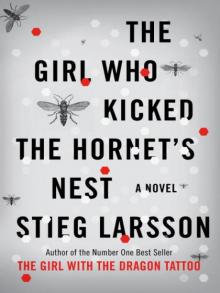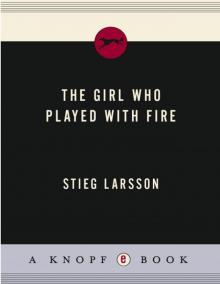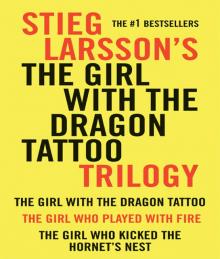- Home
- Stieg Larsson
The Girl Who Kicked The Hornets’ Nest m(-3 Page 2
The Girl Who Kicked The Hornets’ Nest m(-3 Read online
Page 2
“Isn’t that part of the brain associated with numbers and mathematical capacity?” Jonasson said.
Ellis shrugged. “Mumbo jumbo. I have no idea what these particular grey cells are for. You can only do your best. You operate. I’ll look over your shoulder.”
Mikael Blomkvist looked up at the clock and saw that it was just after 3.00 in the morning. He was handcuffed and increasingly uncomfortable. He closed his eyes for a moment. He was dead tired but running on adrenaline. He opened them again and gave the policeman an angry glare. Inspector Thomas Paulsson had a shocked expression on his face. They were sitting at a kitchen table in a white farmhouse called Gosseberga, somewhere near Nossebro. Blomkvist had heard of the place for the first time less than twelve hours earlier.
There was no denying the disaster that had occurred.
“Imbecile,” Blomkvist said.
“Now, you listen here –”
“Imbecile,” Blomkvist said again. “I warned you he was dangerous, for Christ’s sake. I told you that you would have to handle him like a live grenade. He’s murdered at least three people with his bare hands and he’s built like a tank. And you send a couple of village policemen to arrest him as if he were some Saturday night drunk.”
Blomkvist shut his eyes again, wondering what else could go wrong that night.
He had found Salander just after midnight. She was very badly wounded. He had sent for the police and the Rescue Service.
The only thing that had gone right was that he had persuaded them to send a helicopter to take the girl to Sahlgrenska hospital. He had given them a clear description of her injuries and the bullet wound in her head, and some bright spark at the Rescue Service got the message.
Even so, it had taken over half an hour for the Puma from the helicopter unit in Säve to arrive at the farmhouse. Blomkvist had got two cars out of the barn. He switched on their headlights to illuminate a landing area in the field in front of the house.
The helicopter crew and two paramedics had proceeded in a routine and professional manner. One of the medics tended to Salander while the other took care of Alexander Zalachenko, known locally as Karl Axel Bodin. Zalachenko was Salander’s father and her worst enemy. He had tried to kill her, but he had failed. Blomkvist had found him in the woodshed at the farm with a nasty-looking gash – probably from an axe – in his face and some shattering damage to one of his legs which he did not trouble to investigate.
While he waited for the helicopter, he did what he could for Salander. He took a clean sheet from a linen cupboard and cut it up to make bandages. The blood had coagulated at the entry wound in her head, and he did not know whether he dared to put a bandage on it or not. In the end he fixed the fabric very loosely round her head, mostly so that the wound would not be exposed to bacteria or dirt. But he had stopped the bleeding from the wounds in her hip and shoulder in the simplest possible way. He had found a roll of duct tape and this he had used to close the wounds. The medics remarked that this, in their experience, was a brand-new form of bandage. He had also bathed Salander’s face with a wet towel and done his best to wipe off the dirt.
He had not gone back to the woodshed to tend to Zalachenko. He honestly did not give a damn about the man. But he did call Erika Berger on his mobile and told her the situation.
“Are you alright?” Berger asked him.
“I’m O.K.,” Blomkvist said. “Lisbeth is the one who’s in real danger.”
“That poor girl,” Berger said. “I read Björck’s Säpo report this evening. How should I deal with it?”
“I don’t have the energy to think that through right now,” Blomkvist said. Security Police matters were going to have to wait until the next day.
As he talked to Berger, he sat on the floor next to the bench and kept a watchful eye on Salander. He had taken off her shoes and her trousers so that he could bandage the wound to her hip, and now his hand rested on the trousers that he had dropped on the floor next to the bench. There was something in one of the pockets. He pulled out a Palm Tungsten T3.
He frowned and looked long and hard at the hand-held computer. When he heard the approaching helicopter he stuffed it into the inside pocket of his jacket and then went through all her other pockets. He found another set of keys to the apartment in Mosebacke and a passport in the name of Irene Nesser. He put these swiftly into a side pocket of his laptop case.
The first patrol car with Torstensson and Ingemarsson from the station in Trollhättan arrived a few minutes after the helicopter landed. Next to arrive was Inspector Paulsson, who took charge immediately. Blomkvist began to explain what had happened. He very soon realized that Paulsson was a pompous, rigid drill sergeant type. He did not seem to take in anything that Blomkvist said. It was when Paulsson arrived that things really started to go awry.
The only thing he seemed capable of grasping was that the badly damaged girl being cared for by the medics on the floor next to the kitchen bench was the triple murderer Lisbeth Salander. And above all it was important that he make the arrest. Three times Paulsson had asked the urgently occupied medical orderly whether the girl could be arrested on the spot. In the end the medic stood up and shouted at Paulsson to keep the bloody hell out of his way.
Paulsson had then turned his attention to the wounded man in the woodshed, and Blomkvist heard the inspector report over his radio that Salander had evidently attempted to kill yet another person.
By now Blomkvist was so infuriated with Paulsson, who had obviously not paid attention to a word he had said, that he yelled at him to call Inspector Bublanski in Stockholm without delay. Blomkvist had even taken out his mobile and offered to dial the number for him, but Paulsson was not interested.
Blomkvist then made two mistakes.
First, he patiently but firmly explained that the man who had committed the murders in Stockholm was Ronald Niedermann, who was built like a heavily armoured robot and suffered from a disease called congenital analgesia, and who at that moment was sitting in a ditch on the road to Nossebro tied to a traffic sign. Blomkvist told Paulsson exactly where Niedermann was to be found, and urged him to send a platoon armed with automatic weapons to pick him up. Paulsson finally asked how Niedermann had come to be in that ditch, and Blomkvist freely admitted that he himself had put him there, and had managed only by holding a gun on him the whole time.
“Assault with a deadly weapon,” was Paulsson’s immediate response.
At this point Blomkvist should have realized that Paulsson was dangerously stupid. He should have called Bublanski himself and asked him to intervene, to bring some clarity to the fog in which Paulsson was apparently enveloped. Instead he made his second mistake: he offered to hand over the weapon he had in his jacket pocket – the Colt.45 1911 Government model that he had found earlier that day at Salander’s apartment in Stockholm. It was the weapon he had used to disarm and disable Niedermann – not a straightforward matter with that giant of a man.
At which Paulsson swiftly arrested Blomkvist for possession of an illegal weapon. He then ordered his two officers, Torstensson and Ingemarsson, to drive over to the Nossebro road. They were to find out if there was any truth to Blomkvist’s story that a man was sitting in a ditch there, tied to a MOOSE CROSSING sign. If this was the case, the officers were to handcuff the person in question and bring him to the farm at Gosseberga.
Blomkvist had objected at once, pointing out that Niedermann was not a man who could be arrested and handcuffed just like that: he was a maniacal killer, for God’s sake. When Blomkvist’s objections were ignored by Paulsson, the exhaustion of the day made him reckless. He told Paulsson he was an incompetent fool and yelled at him that Torstensson and Ingemarsson should fucking forget about untying Niedermann until they had called for back-up. As a result of this outburst, he was handcuffed and pushed into the back seat of Paulsson’s car. Cursing, he watched as Torstensson and Ingemarsson drove off in their patrol car. The only glimmer of light in the darkness was that Salander had been car
ried to the helicopter, which was even now disappearing over the treetops in the direction of Göteborg. Blomkvist felt utterly helpless: he could only hope that she would be given the very best care. She was going to need it, or die.
Jonasson made two deep incisions all the way down to the cranium and peeled back the skin round the entry wound. He used clamps to secure the opening. A theatre nurse inserted a suction tube to remove any blood. Then came the awkward part, when he had to use a drill to enlarge the hole in the skull. The procedure was excruciatingly slow.
Finally he had a hole big enough to give access to Salander’s brain. With infinite care he inserted a probe into the brain and enlarged the wound channel by a few millimetres. Then he inserted a thinner probe and located the bullet. From the X-ray he could see that the bullet had turned and was lying at an angle of forty-five degrees to the entry channel. He used the probe cautiously to prise at the edge of the bullet, and after a few unsuccessful attempts he managed to lift it very slightly so that he could turn it in the right direction.
Finally he inserted narrow forceps with serrated jaws. He gripped the base of the bullet, got a good hold on it, then pulled the forceps straight out. The bullet emerged with almost no resistance. He held it up to the light for a few seconds and saw that it appeared intact; then he dropped it into a bowl.
“Swab,” he said, and his request was instantly met.
He glanced at the E.C.G., which showed that his patient still had regular heart activity.
“Forceps.”
He pulled down the powerful magnifying glass hanging overhead and focused on the exposed area.
“Careful,” Ellis said.
Over the next forty-five minutes Jonasson picked out no fewer than thirty-two tiny bone chips from round the entry wound. The smallest of these chips could scarcely be seen with the naked eye.
As Blomkvist tried in frustration to manoeuvre his mobile out of the breast pocket of his jacket – it proved to be an impossible task with his hands cuffed behind his back, nor was it clear to him how he was going to be able to use it – several more vehicles containing both uniformed officers and technical personnel arrived at the Gosseberga farm. They were detailed by Paulsson to secure forensic evidence in the woodshed and to do a thorough examination of the farmhouse, from which several weapons had already been confiscated. By now resigned to his futility, Blomkvist had observed their comings and goings from his vantage point in Paulsson’s vehicle.
An hour passed before it dawned on Paulsson that Torstensson and Ingemarsson had not yet returned from their mission to retrieve Niedermann. He had Blomkvist brought into the kitchen, where he was required once more to provide precise directions to the spot.
Blomkvist closed his eyes.
He was still in the kitchen with Paulsson when the armed response team sent to relieve Torstensson and Ingemarsson reported back. Ingemarsson had been found dead with a broken neck. Torstensson was still alive, but he had been savagely beaten. The men had been discovered near a MOOSE CROSSING sign by the side of the road. Their service weapons and the marked police car were gone.
Inspector Paulsson had started out with a relatively manageable situation: now he had a murdered policeman and an armed killer on the run.
“Imbecile,” Blomkvist said again.
“It won’t help to insult the police.”
“That certainly seems to be true in your case. But I’m going to report you for dereliction of duty and you won’t even know what hit you. Before I’m through with you, you’re going to be celebrated as the dumbest policeman in Sweden on every newspaper billboard in the country.”
The notion of being the object of public ridicule appeared at last to have an effect on Inspector Paulsson. His face was lined with anxiety.
“What do you propose?”
“I don’t propose, I demand that you call Inspector Bublanski in Stockholm. This minute. His number’s on my mobile in my breast pocket.”
Inspector Modig woke with a start when her mobile rang at the other end of the bedroom. She saw to her dismay that it was just after 4.00 in the morning. Then she looked at her husband, who was snoring peacefully. He would probably sleep through an artillery barrage. She staggered out of bed, unplugged her mobile from the charger, and fumbled for the talk button.
Jan Bublanski, she thought. Who else?
“Everything has gone to hell down in Trollhättan,” her senior officer said without bothering to greet her or apologize. “The X2000 to Göteborg leaves at 5.10. Take a taxi.”
“What’s happened?”
“Blomkvist found Salander, Niedermann and Zalachenko. Got himself arrested for insulting a police officer, resisting arrest, and for possession of an illegal weapon. Salander was taken to Sahlgrenska with a bullet in her head. Zalachenko is there too with an axe wound to his skull. Niedermann got away. And he killed a policeman tonight.”
Modig blinked twice, registering how exhausted she felt. Most of all she wanted to crawl back into bed and take a month’s holiday.
“The X2000 at 5.10. O.K. What do you want me to do?”
“Meet Jerker Holmberg at Central Station. You’re to contact an Inspector Thomas Paulsson at the Trollhättan police. He seems to be responsible for much of the mess tonight. Blomkvist described him as an Olympic-class idiot.”
“You’ve talked to Blomkvist?”
“Apparently he’s been arrested and cuffed. I managed to persuade Paulsson to let me talk to him for a moment. I’m on my way to Kungsholmen right now, and I’ll try to work out what’s going on. We’ll keep in touch by mobile.”
Modig looked at the time again. Then she called a taxi and jumped into the shower for a minute. She brushed her teeth, pulled a comb through her hair, and put on long black trousers, a black T-shirt, and a grey jacket. She put her police revolver in her shoulder bag and picked out a dark-red leather coat. Then she shook enough life into her husband to explain where she was off to, and that he had to deal with the kids in the morning. She walked out of the front door just as the taxi drew up.
She did not have to search for her colleague, Criminal Inspector Holmberg. She assumed that he would be in the restaurant car and that is where she found him. He had already bought coffee and sandwiches for her. They sat in silence for five minutes as they ate their breakfast. Finally Holmberg pushed his coffee cup aside.
“Maybe I should get some training in some other field,” he said.
Some time after 4.00 in the morning, Criminal Inspector Marcus Erlander from the Violent Crimes Division of the Göteborg police arrived in Gosseberga and took over the investigation from the overburdened Paulsson. Erlander was a short, round man in his fifties with grey hair. One of the first things he did was to have Blomkvist released from his handcuffs, and then he produced rolls and coffee from a thermos. They sat in the living room for a private conversation.
“I’ve spoken with Bublanski,” Erlander said. “Bubble and I have known each other for many years. We are both of us sorry that you were subjected to Paulsson’s rather primitive way of operating.”
“He succeeded in getting a policeman killed tonight,” Blomkvist said.
Erlander said: “I knew Officer Ingemarsson personally. He served in Göteborg before he moved to Trollhättan. He has a three-year-old daughter.”
“I’m sorry. I tried to warn him.”
“So I heard. You were quite emphatic, it seems, and that’s why you were cuffed. You were the one who exposed Wennerström last year. Bublanski says that you’re a shameless journalist bastard and an insane private investigator, but that you just might know what you’re talking about. Can you bring me up to speed so that I can get the hang of what’s going on?”
“What happened here tonight is the culmination of the murders of two friends of mine in Enskede, Dag Svensson and Mia Johansson. And the murder of a person who was no friend of mine… a lawyer called Bjurman, also Lisbeth Salander’s guardian.”
Erlander made notes between taking sips of his coffe
e.
“As you no doubt know, the police have been looking for Salander since Easter. She was a suspect in all three murders. First of all, you have to realize that Salander is not only not guilty of these murders, she has been throughout a victim in the whole affair.”
“I haven’t had the least connection to the Enskede business, but after everything that was in the media about her it seems a bit hard to swallow that Salander could be completely innocent.”
“Nonetheless, that’s how it is. She’s innocent. Full stop. The killer is Ronald Niedermann, the man who murdered your officer tonight. He works for Karl Axel Bodin.”
“The Bodin who’s in Sahlgrenska with an axe in his skull?”
“The axe isn’t still in his head. I assume it was Salander who nailed him. His real name is Alexander Zalachenko and he’s Lisbeth’s father. He was a hit man for Russian military intelligence. He defected in the ’70s, and was then on the books of Säpo until the collapse of the Soviet Union. He’s been running his own criminal network ever since.”
Erlander scrutinized the man opposite him. Blomkvist’s face was shiny with sweat, but he looked both frozen and deathly tired. Until now he had sounded perfectly rational, but Paulsson – whose opinion had little influence on Erlander – had warned him that Blomkvist had been babbling on about Russian agents and German hit men – hardly routine elements in Swedish police work. Blomkvist had apparently reached the point in his story at which Paulsson had decided to ignore everything else he might say. But there was one policeman dead and another severely wounded on the road to Nossebro, so Erlander was willing to listen. But he could not keep a trace of incredulity out of his voice.
“O.K. A Russian agent.”
Blomkvist smiled weakly, only too aware of how odd his story sounded.
“A former Russian agent. I can document every one of my claims.”
“Go on.”
“Zalachenko was a top spy in the ’70s. He defected and was granted asylum by Säpo. In his old age he became a gangster. As far as I understand it, it’s not a unique situation in the wake of the Soviet Union’s collapse.”

 The Girl with the Dragon Tattoo
The Girl with the Dragon Tattoo The Girl Who Kicked the Hornet's Nest
The Girl Who Kicked the Hornet's Nest The Girl Who Played with Fire
The Girl Who Played with Fire The Girl with the Dragon Tattoo m(-1
The Girl with the Dragon Tattoo m(-1 The Girl who played with Fire m(-2
The Girl who played with Fire m(-2 Millennium 01 - The Girl with the Dragon Tattoo
Millennium 01 - The Girl with the Dragon Tattoo The Girl Who Kicked The Hornets’ Nest m(-3
The Girl Who Kicked The Hornets’ Nest m(-3 Millennium 02 - The Girl Who Played with Fire
Millennium 02 - The Girl Who Played with Fire Millennium 03 - The Girl Who Kicked the Hornet's Nest
Millennium 03 - The Girl Who Kicked the Hornet's Nest The Girl With the Dragon Tattoo Trilogy Bundle
The Girl With the Dragon Tattoo Trilogy Bundle![Millenium [02] The Girl Who Played With Fire Read online](http://i1.bookreadfree.com/i2/04/12/millenium_02_the_girl_who_played_with_fire_preview.jpg) Millenium [02] The Girl Who Played With Fire
Millenium [02] The Girl Who Played With Fire